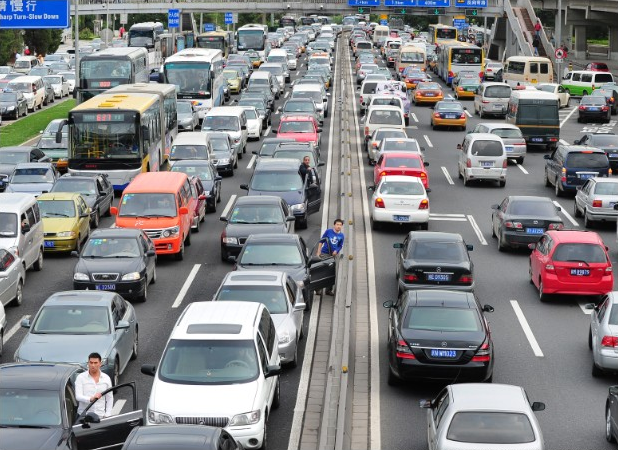China’s epic traffic nightmares
By Charles Riley
7 October 2012 (CNN Money) – More people live in China than any other country, and in 2010 it surpassed the United States as the largest car market on Earth. As the popularity of automobiles grows, China’s infrastructure has struggled to keep pace. The result is – like anywhere else in the world – traffic jams. Yet traffic jams in China are not always brief hiccups during the evening commute. In fact, the worst jams in China, while rare, can last for days. In August 2010, a particularly extreme traffic snafu practically shut down the road between Inner Mongolia and Beijing. Construction on a section of the Beijing-Tibet Expressway forced more traffic to National Expressway 110, which runs roughly parallel. The resulting gridlock tied up 62 miles of highway and took some drivers nine days to traverse. The jam eventually cleared, but some observers labeled it an example of how China’s rapid growth has outstripped urban planning — a trend that can lead to environmental and social costs. The August 2010 traffic meltdown is an extreme case. But some of China’s urban centers do face persistent problems with traffic. Both Beijing and Shenzhen, an industrial city in southern China, occupy two of the top three places on IBM’s 2011 “Commuter Pain Index.” The report found that “huge numbers of drivers” in the two cities “have simply turned around and gone home rather than dealing with the frustration of their intended journey.”
The IBM report also found that of all cities surveyed, anger about traffic was “by far” the highest in Shenzhen and Beijing. That fact underscores something of a modern universal truism: Nobody likes to sit in traffic. China’s government is keenly aware of this and has undertaken a variety of measures to alleviate congestion.
In order to alleviate growing traffic problems, officials in Guangzhou, a major city in Guangdong province, said they would halve the number of new cars on the streets by holding license plate auctions and lotteries. Beijing started a similar program last year, and Shanghai instituted its own license auction in 2000. The efforts highlight a balancing act in China’s big cities: Officials are trying to improve the quality of life but not drag down local economic growth.
China’s epic traffic nightmares
